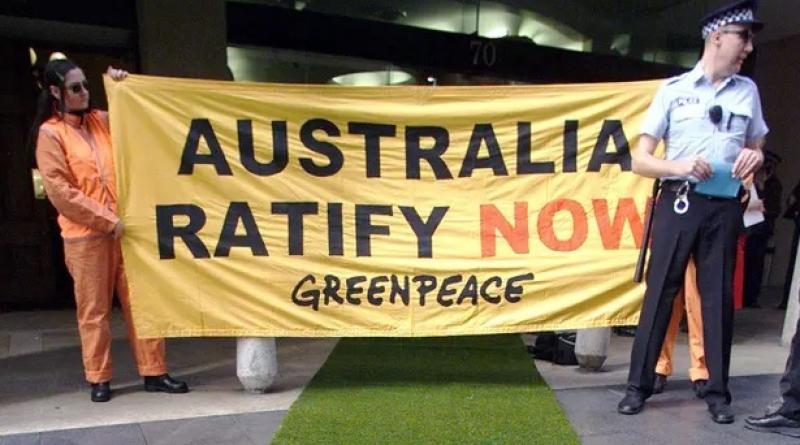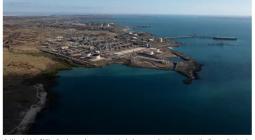Before Australia’s climate wars: when a Coalition cabinet leaned towards positive action

Cabinet papers 2001: Despite fierce battles between senior Coalition members, work had begun in 2001 on a national energy policy
John Howard still describes himself as “climate change agnostic” even though his government proposed an emissions trading scheme before the 2007 election.
How different Australia’s response to climate change might have been if he had not lost the election.
The 2001 cabinet papers, released by the National Archives of Australia on Saturday, supply further evidence of serious concerns and active ministerial work on climate change inside the Howard government, the archive’s historian, Chris Wallace said.
There were fierce battles, but the cabinet often proved “a moderating force”, she said, forcing ministers to work together on policy solutions.
“This can only have happened with John Howard’s assent and it reflects well on him. It arguably reflects, too, Howard’s greater capacity to manage internal policy differences and personnel than his successors possessed,” Wallace said.
The faultline within the cabinet was on display in 2001 as it attempted to finalise its stance for a national energy policy to be negotiated with the states through the Council of Australian Governments.
Senator Nick Minchin, one the leading climate change sceptics, brought the paper to cabinet in March.
“We will continue to be heavily dependent on fossil fuels for the foreseeable future,” it said.
It made almost no mention of climate change or renewables, particularly in the energy generation sector.
Instead Minchin’s paper put the emphasis on consumer prices, a national energy market and sustained improvements in energy efficiency.
Then as now, gas was privileged in the energy mix. There were a number of measures to promote the use and export of natural gas and the development of resources off north-western Australia and the Northern Territory.
Robert Hill’s environment department was highly critical of Minchin’s proposal.
“[The] cursory treatment of climate change and other environmental issues is not proportionate with their significance for energy policy and for key stakeholders in this sector. Nor is it consistent with the Coag communique of November 2000, which specifically called for the environmental impacts of energy supply and use to be encompassed within this strategy.
“We note that the independent inquiry into energy market development and prospects overlooks climate change and other environmental issues. Given that energy market reform has (unwittingly) contributed to rapid and significant emissions growth in what is Australia’s single largest emissions source, we request that the terms of reference for this inquiry encompass options for reducing the greenhouse and adverse environmental impacts of the reform process.”
The cabinet decision directed Hill and Minchin to come back “as matter of urgency” with a joint negotiating position on energy policy.
Wallace said the papers confirmed that Hill was not alone in those concerns, and that the balance of cabinet opinion was with him.
Meanwhile Australia was trying to balance its commitment to work with the international community on climate change against its relationship with its most important ally, the United States.
Under President George W Bush, the US had opposed the Kyoto agreement, and ordered a review of its policy led by the vice-president, Dick Cheney, a former executive at the oil services company Halliburton.
Howard had already written to Bush saying he shared Bush’s concerns about having a cost-effective outcome from Kyoto but believed an international agreement was the right path.
A cabinet memo in May shows Australia was uncertain about where the Cheney review was heading.
It noted that the Bush administration’s new energy policy focused “heavily on the supply side and will accelerate growth in United States emissions”, which did not bode well.
What to do next? They decided that Howard should write another letter.
It would suggest that an effective global framework to address climate change needed to include commitments from all major emitters; unrestricted market-based mechanisms, including emissions trading; an approach to carbon sinks that captured both economic and environmental opportunities; and a facilitative, rather than punitive, compliance system.
Howard told Bush US leadership was essential if efforts to address climate change were to be successful.
In February 2002, Bush announced his alternative to the Kyoto protocol, with a plan to reduce the intensity of greenhouse gases by 18% over 10 years – that meant emissions would still continue to grow, but more slowly.
Because of the US position, getting agreement of other nations on Kyoto was difficult but eventually 192 parties signed the treaty. Australia was permitted to take account of changes in land-clearing policy, which allowed it to achieve its target.
Water, salinity and land clearing were important environmental issues for cabinet in 2001.
In March the cabinet agreed on a detailed offer to the Queensland premier, Peter Beattie, for commonwealth support to reduce land clearing in Queensland to help meet the nation’s Kyoto targets. Up to $50m would be made available on a 50:50 basis with the state to buy back land and reduce land clearing from 200,000 hectares a year to 50,000 by 2006.





